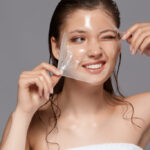Skin Peels: A Comprehensive Guide
Skin peels, also known as chemical peels, are a popular skincare treatment designed to rejuvenate and revitalize the skin. By removing the outer layers of dead skin cells, peels can address a variety of concerns, from acne and hyperpigmentation to fine lines and uneven texture. Here’s an in-depth look at skin peels, their benefits, types, and what to expect during and after the treatment.

What Are Skin Peels?
Skin peels involve the application of a chemical solution to the skin, which exfoliates the outer layers and promotes the growth of new, healthier skin. The depth and intensity of the peel depend on the type of solution used, ranging from superficial to deep peels. This process can improve skin tone, texture, and overall appearance.
Benefits of Skin Peels
- Exfoliation: Removes dead skin cells, revealing smoother skin.
- Brightening: Reduces dullness and evens out skin tone.
- Acne Control: Unclogs pores and reduces breakouts.
- Anti-Aging: Minimizes fine lines, wrinkles, and sun damage.
- Hyperpigmentation: Fades dark spots, melasma, and post-inflammatory marks.
Types of Skin Peels
-
Superficial Peels:
- Use mild acids like alpha-hydroxy acids (AHAs) or beta-hydroxy acids (BHAs).
- Target the outermost layer of skin. Minimal downtime, ideal for first-time users.
-
Medium Peels:
- Use stronger acids like trichloroacetic acid (TCA).
- Penetrate deeper into the skin.
- Address moderate skin concerns with a few days of recovery.
-
Deep Peels:
- Use potent acids like phenol.
- Reach the deeper layers of the skin.
- Provide dramatic results but require significant downtime.
What to Expect During the Treatment
- Consultation: A skincare professional assesses your skin type and concerns to recommend the appropriate peel.
- Preparation: The skin is cleansed and prepped for the treatment.
- Application: The chemical solution is applied evenly to the skin.
- Neutralization: The peel is neutralized and removed after the desired time.
- Aftercare: A soothing moisturizer or sunscreen is applied to protect the skin.
Aftercare Tips
- Hydration: Keep the skin moisturized to aid healing.
- Sun Protection: Use sunscreen to prevent UV damage.
- Avoid Irritants: Steer clear of harsh products or exfoliants.
- Patience: Allow the skin to peel naturally; do not force it.
Who Should Avoid Skin Peels?
- Individuals with active skin infections or open wounds.
- Those with sensitive skin or conditions like eczema or rosacea.
- Pregnant or breastfeeding women should consult a doctor before treatment.
Conclusion
Skin peels are a versatile and effective solution for achieving radiant, healthy skin. Whether you opt for a superficial, medium, or deep peel, the key is to choose a treatment that aligns with your skin type and concerns. Always consult a licensed professional to ensure safe and optimal results. With proper care and maintenance, skin peels can transform your complexion and boost your confidence.
